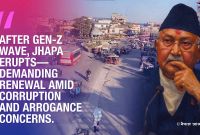Inexperience and Organizational Gaps Pose Major Challenges for Bangladesh's Interim Government

Bangladesh’s newly-formed interim government, led by Nobel laureate Professor Muhammad Yunus, is facing mounting challenges due to a lack of political experience and organizational weakness. The interim government, which took office amid widespread public dissatisfaction with the previous Awami League administration, has struggled to maintain stability in its early days.
The government's inexperience was highlighted within nine days of its formation when it was forced to reshuffle its cabinet. Brigadier General (retd) M Sakhawat Hossain, initially appointed as the Home Ministry adviser, was reassigned to the Ministry of Textile and Jute Development following public protests led by the BNP and Jamaat over his controversial remarks. Lt Gen (retd) Jahangir Alam Chowdhury, former director general of Bangladesh Rifles, replaced him as the new Home Ministry adviser.
Student leaders Nahid Islam and Asif Mahmud Sajib Bhuiyan, both from Dhaka University, were appointed as ministers, taking on key portfolios including Posts, Telecommunications and Information Technology, and the Ministry of Information and Broadcasting. Their involvement has been met with mixed reactions, as some applaud the fresh perspective they bring, while others question their ability to manage such critical roles without prior experience.
The interim government, seen by many as heavily influenced by the military, is under constant pressure from various political forces, including the BNP and Jamaat. The army's strategy of leveraging student movements to curb the BNP's influence has added another layer of complexity to the political landscape.
With public trust in traditional political parties like the BNP and Awami League eroding, the army is reportedly exploring the possibility of holding elections without these major parties. This has sparked discussions about the formation of a new political organization comprising intellectuals and professionals in support of the students.
However, the interim government’s honeymoon period may be short-lived. The polarizing effect of its actions on the country's institutions, coupled with its inexperience, could soon lead to widespread dissatisfaction. The BNP, which has been quietly rebuilding its strength, is expected to mount a significant challenge in the coming months, potentially leading to renewed political unrest.
As Bangladesh navigates this uncertain period, the interim government faces the daunting task of maintaining public confidence while managing the complex interplay of political and military forces. The coming months will be a critical test for Professor Yunus and his administration, as they strive to meet the expectations of a nation hungry for change.




![From Kathmandu to the World: How Excel Students Are Winning Big [Admission Open]](https://nepalaaja.com/img/70194/medium/excel-college-info-eng-nep-2342.jpg)
